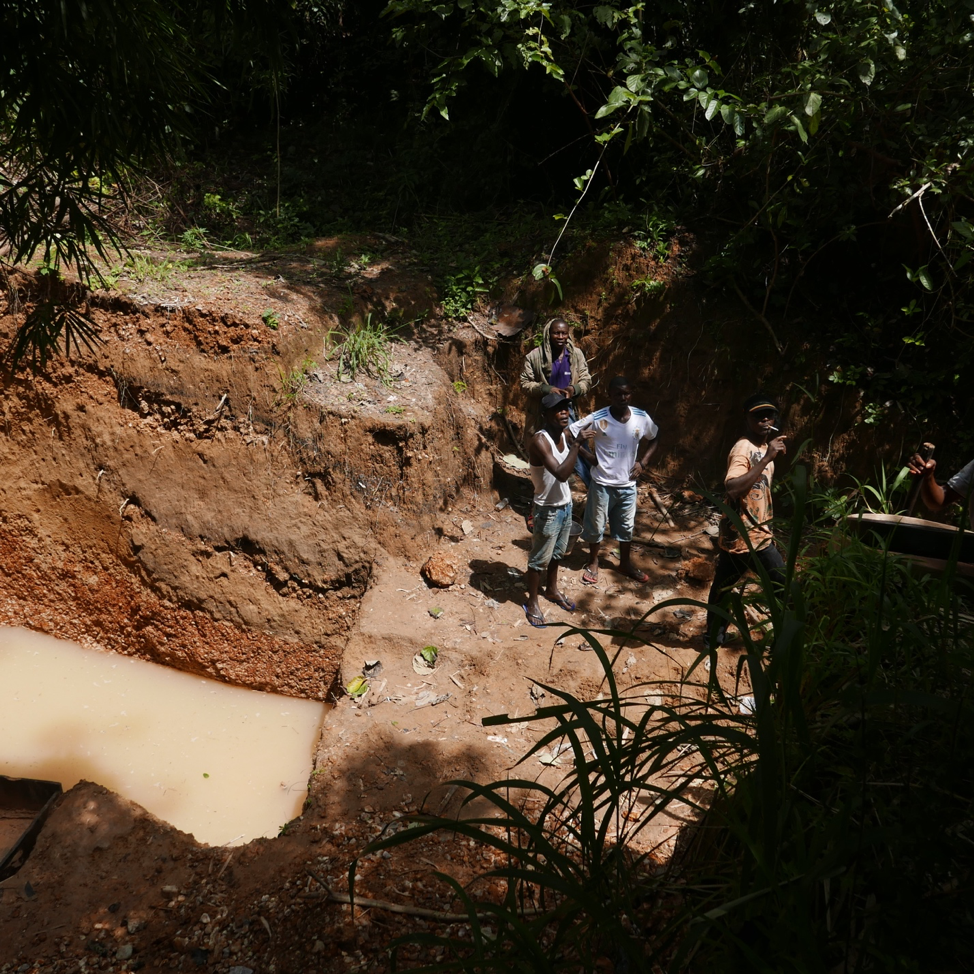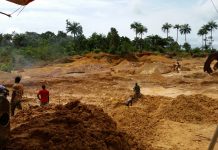Banner Image: Artisanal miners often dig large holes and abandon them. The DayLight/Varney Kamara
By Varney Kamara
GBARMA, Gbarpolu County- Artisanal miners across villages in Gbarpolu County have been trained to carry on smart mining, a sustainable method that seeks to protect the Gola National Park. The park has over 60 plant and animals species and protecting it has been a number one priority for conservation groups.
Miners across Kumgbor, Camp Alpha and Timber Village, Gbarpolu and Lofa Bridge, Grand Cape Mount County, gathered in Gbarma over the weekend to learn how to dig, refill holes and reclaim the land. They are also taught the processes and procedures that qualify one to be a legal miner. At least 115 artisanal miners have been trained to apply the new method across Gbarpolu, Grand Cape Mount and Bomi, according to organizers of the training.
“This method is crucial to saving lives, the environment, and the Gola National park,” says Richard Hoff, program coordinator of the Society for the Conservation of Nature of Liberia, which oversees the training. “Using smart mining or sustainable mining will make communities reclaim their land several years after mining.”
SCNL, a forest conservation group, helped form the park in 2018, an 88,000-hectare forest, home to endangered and endemic species of mammals, bats, and rodents. Prior to its formation, villagers largely survived on illicit mining and hunting, but years of consistent advocacy and campaigning for the protection of the forest have seen a steady decline in the illegal trade, according to a study by the Royal Society for the Protection of Birds (RSPB) and SCNL. Liberia’s wildlife law bans illegal entry into a national park, a move meant to protect the country’s rich biodiversity.
Artisanal miners washing and panning for diamonds. The DayLight/Varney Kamara
Artisanal mining, which contributes more to the Liberian economy, has been characterized by years of unsafe practices that have posed environmental problems for communities. In search of gold and diamond, miners have dug holes without refilling, leaving them as death traps for both humans and wildlife. Insecure mining across communities has also resulted to the loss of lives in the past. In February 2019, 35 people died in Liberia’s northeastern Nimba County after a pit collapsed at a mining camp. The incident, which drew local and international attention, was among the worst mining disasters the country has recorded in recent years. Artisanal miners in Liberia do not obtain environmental permits to operate. Under the country’s mining law, a small-scale miner can obtain up to 25 acres.
Small-scale mining has been a major source of income in the country, contributing more to the Liberian economy. Liberia has over 100,000 artisanal miners, who are spread across different mining regions.
Liberia’s Environmental Protection and Management Law does not require artisanal miners to obtain an environmental permit. In 2016, the Ministry of Mines and Energy developed a roadmap to regulate artisanal and small-scale miners to encourage them to organize into cooperatives, which could improve working conditions and attract foreign investments. However, implementation of the roadmap is still pending.
Smart mining, a new mining technique that also involves a smartphone technology that allows miners to easily detect diamond or gold deposits at a particular location underneath the ground, is a new method that miners have been thought to reverse Liberia’s tragic mining history. The new mining expertise avoids the digging of scattered boogieman holes and sets a standard for the enforcement of mining rules across communities bordering the Gola Park.
“We are faced with lots of problems ranging from miners to hunters. Hopefully, I believe the new system will not only bring safety but will provide understanding for miners to know where and how to mine.” says Austin S. Paul, Administrator of the Gola National Park.”
But learning new mining rules was not the not only knowledge offered.
The mining mentorship also included a civic education scheme that warned miners against illicit mining which the country has struggled with for decades. Among other things, the training enhanced participants’ understanding of how miners can legitimize and regularize their status with the government. It thought miners specific guidance on their meets and bounds, also offering education on the criteria to qualify one to be a legitimate miner. Participants were taught how to get communities involved in the process of granting mining claims to individuals, including procedures and processes required to obtain mining licenses, registration permits, and knowledge on their rights and limitations. The conference also thought lessons on how to minimize illicit mineral trade and guarantee financial benefits for both the government and miners through straight adherence to the rules governing the sector.
Smart mining, a new mining technology, is also the latest conservationists’ approach in dealing with the wider problems illicit mining has created for the country. Liberia has over three trillion ounces of gold deposits but has lost millions of dollars of this important tax revenue to illegal mining, according to the Liberia-Commercial Guide 2020 report. The loss in the country’s extractive income also reflects a wider scheme of the unlawful financial system that has caused Sub-Saharan Africa as much as $70bn annually, according to the International Bar Association (IBA) 2017 report which laid emphasis on illicit financial flows from Africa. Inadequate supervision and lack of enforcement of mining regulations have been the root cause of this, campaigners say.
“We will enforce the law and will close down those mining claims that will fail to abide by the rules,” says Samuel Tawah, a mining agent in Gbarma.





Facebook Comments